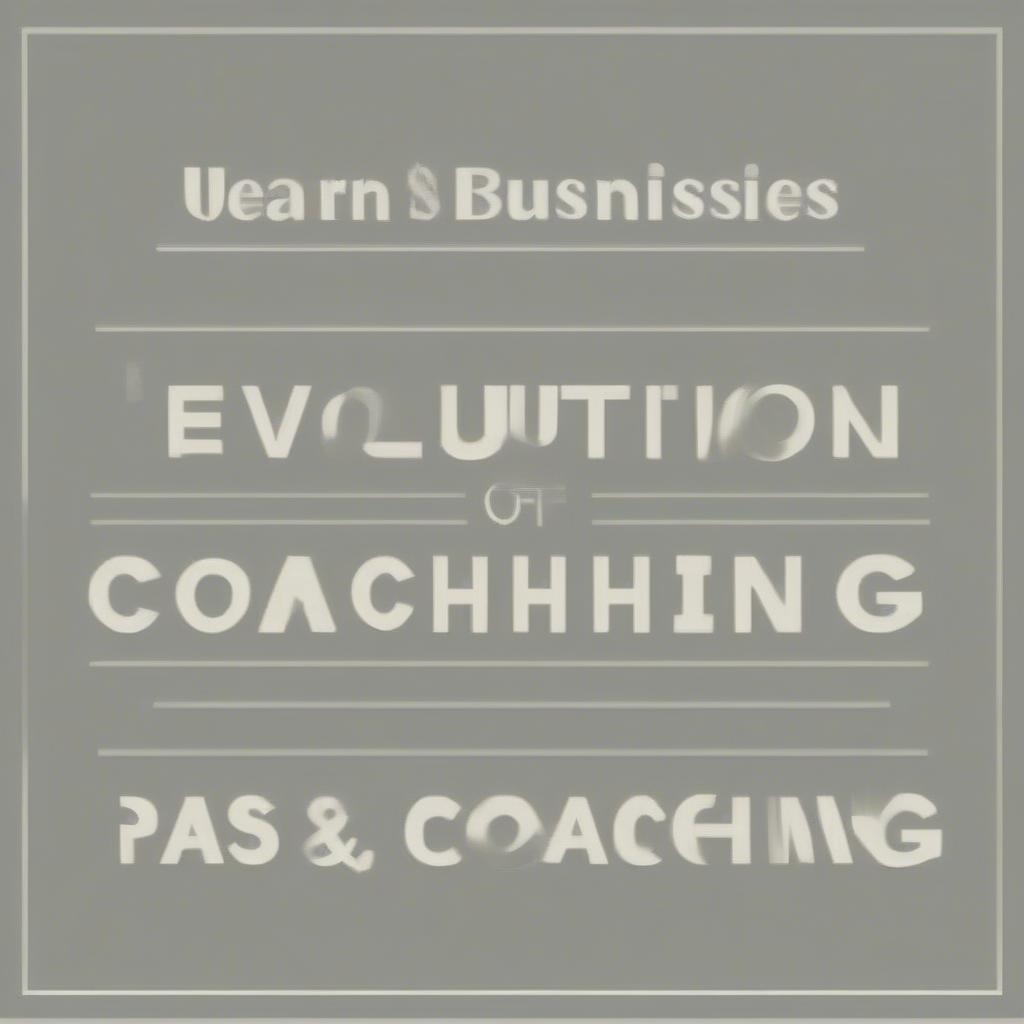
Coaching, at its heart, is about human connection and growth. But beneath the surface of powerful questions and transformative insights lies a crucial foundation: ethics. Without a strong ethical framework, the coach-client relationship can quickly crumble, hindering progress and eroding the very trust it seeks to build. This article delves into the core principles of coaching ethics, explores the importance of client trust, and provides practical guidance on maintaining professional conduct in every interaction.
Why Ethics in Coaching Matter
The Vulnerability of the Client
Clients often come to coaching during times of change, uncertainty, or personal struggle. They’re vulnerable, opening up about their fears, dreams, and deepest insecurities. This inherent vulnerability places a significant responsibility on the coach. Without a commitment to ethical practice, a coach can easily abuse their position, inadvertently causing harm instead of helping.
- Emotional Safety: Ethical coaching creates a safe space where clients feel comfortable being open and honest without fear of judgment or exploitation.
- Power Dynamics: The coach-client relationship is inherently imbalanced. The coach holds power in their expertise, and ethical guidelines ensure this power isn’t misused.
- Preventing Harm: Unethical behaviors can lead to psychological distress, financial exploitation, or even the client feeling worse off than when they started.
The Impact on the Coaching Profession
The integrity of the coaching profession depends heavily on its ethical standards. When coaches act unethically, it damages the reputation of the entire field, making potential clients wary and diminishing the credibility of coaching as a whole.
- Maintaining Credibility: Upholding ethical standards ensures that coaching is viewed as a legitimate and valuable profession.
- Attracting Clients: Clients are more likely to engage with coaches who demonstrate a clear commitment to ethical behavior.
- Industry Growth: When coaching is perceived as safe and ethical, it attracts more clients, contributing to the industry’s growth and sustainability.
Core Principles of Coaching Ethics
While specific codes of conduct may vary across coaching organizations, some core principles underpin all ethical coaching practices.
Confidentiality
Confidentiality is paramount in the coach-client relationship. It means respecting and protecting the client’s privacy by not sharing any information discussed during coaching sessions.
- What it Means: Information shared during coaching sessions stays strictly between the coach and the client, unless legally obligated otherwise.
- The Exception: There are exceptions to confidentiality, such as when a client discloses intent to harm themselves or others, or if legal authorities require information.
- Clear Agreement: Coaches should clearly outline the boundaries of confidentiality in their coaching agreements, including how client data is stored and protected.
Integrity
Integrity means being honest, truthful, and transparent in all interactions. It’s about aligning your words with your actions and upholding high standards of ethical conduct.
- Representing Credentials: Coaches should accurately represent their training, qualifications, and experience.
- Avoiding Misleading Claims: Avoid making guarantees about coaching outcomes or promising unrealistic results.
- Conflict of Interest: Be transparent about any potential conflicts of interest and address them appropriately.
Respect
Respect is acknowledging the client’s autonomy, values, and perspectives. It’s about valuing their uniqueness and supporting their self-discovery process.
- Client Autonomy: Empower clients to make their own decisions and choices.
- Cultural Sensitivity: Recognize and respect the client’s cultural background, beliefs, and values.
- Non-Judgmental Approach: Create a safe space for clients to express themselves without judgment.
Professional Boundaries
Maintaining clear professional boundaries is essential for ensuring the coach-client relationship remains healthy and focused on the client’s goals.
- Avoiding Dual Relationships: Avoid engaging in personal or business relationships with clients outside the coaching context.
- No Romantic or Sexual Relationships: Romantic or sexual relationships with clients are unethical and harmful.
- Gift Policies: Establish a clear policy about accepting gifts from clients.
- Social Media Interaction: Be mindful of interactions with clients on social media, maintaining a professional distance.
Competence
Ethical coaches must possess the necessary skills, knowledge, and experience to provide effective coaching.
- Continuous Development: Commit to ongoing learning and development to enhance coaching skills.
- Know Your Limits: Recognize when a client’s needs fall outside your expertise and refer them to another professional.
- Supervision: Seek supervision from a more experienced coach to improve your practice.
Building Client Trust: Practical Strategies
Trust isn’t built overnight; it’s cultivated over time through consistent ethical behavior and genuine care.
Start with a Strong Foundation
- Clear Coaching Agreement: A comprehensive coaching agreement clarifies expectations around confidentiality, fees, session frequency, and other important logistical matters.
- Open Communication: Establish a culture of open and honest communication from the very first interaction.
- Transparency About Approach: Clearly explain your coaching methodology and what clients can expect.
Be Present and Attentive
- Active Listening: Give clients your undivided attention and truly listen to what they’re saying.
- Empathy and Understanding: Demonstrate empathy by acknowledging and validating the client’s feelings.
- Non-Verbal Communication: Be aware of your body language and how it might affect the client’s comfort level.
Demonstrate Authenticity and Vulnerability
- Share Your Own Experiences Appropriately: While the focus should be on the client, sharing relevant personal experiences can help build connection and trust.
- Acknowledge Mistakes: Be willing to admit when you make a mistake or don’t have all the answers.
- Show Genuine Care: Let clients know you genuinely care about their well-being and success.
Maintain Consistency and Reliability
- Be Punctual and Prepared: Start and end sessions on time and come prepared with relevant materials.
- Follow Through on Commitments: Do what you say you’re going to do.
- Be Accessible When Needed: Let clients know how and when they can reach you between sessions.
Handling Ethical Dilemmas
Even with the best intentions, ethical dilemmas can arise in coaching. It’s crucial to be prepared to handle these situations responsibly.
- Self-Reflection: Regularly examine your own values, biases, and how they might impact your coaching practice.
- Seek Guidance: If you encounter a tricky ethical issue, seek advice from a mentor, supervisor, or ethical committee.
- Documentation: Keep thorough notes of all sessions and any ethical concerns that arise.
Examples of Ethical Dilemmas in Coaching
To solidify your understanding of ethical practice, consider some common ethical dilemmas coaches may encounter:
- A client reveals they are having an affair: How do you navigate this situation, maintaining confidentiality while also being mindful of potential harm?
- A client wants to achieve a goal you don’t believe is aligned with their values: How do you empower them to explore their options while still honoring their autonomy?
- A client develops feelings for you: How do you manage this situation while maintaining clear professional boundaries?
- You realize you’re not competent to help the client with a specific issue: How do you navigate the referral process while still supporting the client?
- A client offers you a substantial gift: How do you handle this while ensuring you’re following professional boundaries?
- You discover a conflict of interest: How do you address the conflict transparently with your client?
Each of these examples highlights the need for careful consideration, ethical awareness, and the willingness to seek support and guidance when necessary.
The Benefits of Ethical Coaching
When you commit to ethical coaching practices, you create a positive and supportive environment for your clients and for your own professional development.
For the Client:
- Enhanced Trust: Clients feel safe, secure, and more willing to engage fully in the coaching process.
- Increased Vulnerability: Clients are more likely to be honest and open, leading to greater self-awareness and growth.
- More Effective Coaching: When built on a foundation of trust, coaching becomes more impactful and transformative.
- Empowerment: Clients feel empowered to take ownership of their goals and their lives.
For the Coach:
- Enhanced Professional Reputation: A reputation for ethical behavior builds trust and attracts more clients.
- Increased Confidence: Knowing you’re upholding high ethical standards boosts your confidence and satisfaction as a coach.
- Reduced Risk of Legal Issues: Ethical practices protect you from potential legal issues or disciplinary action.
- A More Rewarding Career: Coaching with integrity and compassion makes for a more meaningful and fulfilling career.
Internal Promotion: How Learn Business Supports Your Coaching Journey
At Learn Business, we understand the critical role ethics plays in building a thriving coaching practice. We’re committed to supporting coaches by providing the tools, resources, and guidance you need to operate with integrity and professionalism.
We offer a range of resources tailored to meet the needs of coaches at every stage:
- Customizable Coaching Agreements: Our templates help you create clear and comprehensive agreements with your clients. These templates cover essential details such as confidentiality, cancellation policies, and payment terms, ensuring a solid foundation for your coaching relationship.
- Ethical Framework Checklists: We offer checklists to help you review your coaching process and ensure you adhere to ethical standards of professional conduct. These checklists are designed to prompt reflection on areas where improvements might be needed.
- Business Development Guides: Our guides focus on ethical marketing strategies and client acquisition to attract clients in a manner aligned with your values. We emphasize building a business that is both successful and ethically sound.
- Client Onboarding Process Templates: We provide templates to help you onboard your clients smoothly, including intake forms, welcome packets, and coaching session summaries, promoting transparency and clarity from the very beginning.
- Legal Forms and Contracts: We help you navigate the necessary legal requirements for running a coaching practice, including contracts, non-disclosure agreements, and data protection documents, ensuring you operate within the law.
Learn Business is more than just a resource provider; we’re your partner in creating a sustainable and ethical coaching business that transforms lives and positively impacts the community. We believe that by combining expertise with integrity, coaches can make a significant difference in the world.
Conclusion: The Ongoing Journey of Ethical Coaching
The ethics of coaching is not a static concept; it’s an ongoing journey of learning, reflection, and growth. As coaches, we must continually strive to improve our ethical awareness, refine our professional conduct, and build trusting relationships with our clients. By embracing the core principles of confidentiality, integrity, respect, and professional boundaries, coaches can create a powerful and transformative experience for their clients while contributing to a stronger and more credible coaching profession. The investment in ethical coaching is not just an investment in your clients’ success, but in your own success and the future of the coaching field as a whole. Remember, the most impactful coaching is rooted in trust, and trust is built on the firm foundation of ethical conduct.



Leave a Reply